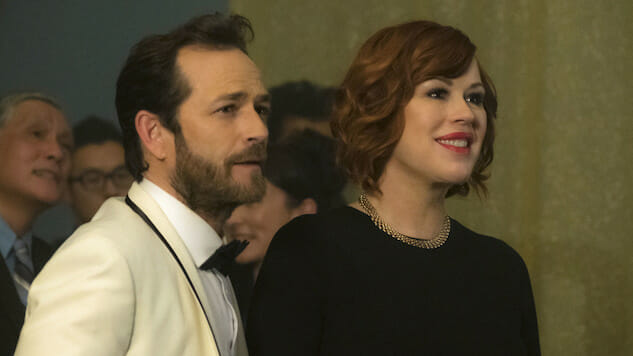Riverdale: Blast from the Past
(Episode 1.11)
Katie Yu/The CW
At the beginning of “Chapter Eleven: To Riverdale and Back Again,” Jughead (Cole Sprouse) mentions that a common refrain around Riverdale is that Jason Blossom’s (Trevor Stines) murder changed everything. It’s a common enough refrain for anyone to utter after a traumatic event, an acknowledgement of a shift in perspective that will never be the same again. Of course, Jughead doesn’t stop there, because what would an episode of Riverdale be without a rambling opening voiceover? He questions the statement, saying that while Jason’s murder may have been a tragic moment for the town, many things stayed the same, evidenced by this year’s Homecoming. If everything had truly changed, why were the relics and traditions of the past still there? Do those rituals and traditions act as a way to work through trauma, or do they only serve as a glossy surface that masks the rot and corruption underneath?
Jughead eventually puts a version of that question front and center when FP (Skeet Ulrich), who’s seemingly cleaned up his act and taken an interest in his son’s novel, starts to ask some questions about why Jughead is so interested in Jason’s murder. Jughead’s rebuke is that his story isn’t a whodunit, but rather an examination of whether Riverdale is a good place or one of barely concealed evil. It’s also a thesis statement for Riverdale, which is more interested in exploring the dynamic of this town than it is in solving the Blossom murder. In fact, as the season nears its conclusion, it’s becoming clear that Jughead is right in his analysis that Jason Blossom’s murder didn’t “change everything” about the town. Where he missteps is in his conclusion. He says that all the wholesome traditions, from Homecoming to grabbing a burger at Pop’s, stayed the same. That may be true, but the reason Jason’s murder didn’t change anything in Riverdale isn’t because of the resolve of its people to move past tragedy and violence. It’s because the tragedy and violence has been there all along. A dead body may be new, but the motivations and machinations behind it are the core of Riverdale.
Homecoming is like a flood that seeps into the ground of Riverdale and brings up all the bodies that have been buried for years. Despite the streamers, the lighting and the rather stilted rendition of “Kids in America”—if the “Archie’s musical ambitions” storyline went the way of Jason Blossom, I wouldn’t shed a tear—there’s a stench surrounding the event. Ghosts loom everywhere (but no Grandma Blossom, unfortunately). The first ghost appeared at the end of “The Lost Weekend,” as Mary Andrews (Molly Ringwald) strolled back into town. “It’s nice, I’m just not used to it,” says Archie (K.J. Apa) when he comes home to find his parents casually chatting in the kitchen. The intrusion of normalcy in extremely abnormal circumstances is the most prominent theme of the episode, and Mary’s presence is just the beginning.